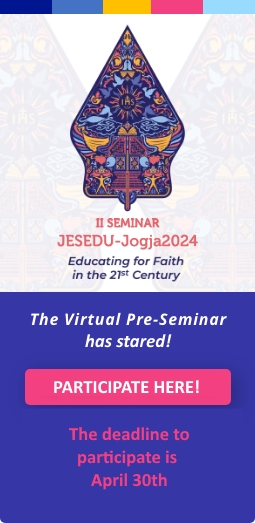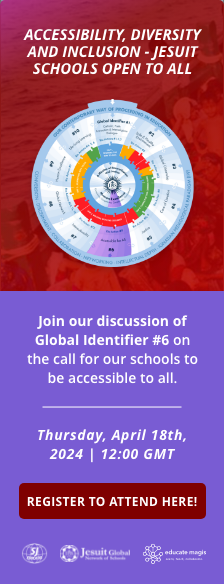It was my first time to take part in a virtual retreat and I felt quite privileged to have had the opportunity. A couple of things stood out for me each day but I will limit myself to five aspects. First is a statement that was shared by one of the retreat leaders which I have reflected on deeply: “I am not God. I cannot control everything”. What we are going through right now forces us to accept the reality that we are not in control of what happens in the world and as educators we cannot control what happens to our students in their homes. This is a reality that is both terrifying and consoling. It is terrifying in the sense that we just need to constantly remind ourselves that sometimes things will happen contrary to our plans. The same reality is consoling in the sense that we are not leaving this matter in the hands of another human being but in the hands of God. Therefore, let us rest knowing that God has everything in control and that He will lead us to attain the goals we have set for our classes and lead our students to realizing their aspirations.
Core Identity is the second aspect that stood out for me during this retreat. The Retreat Leaders reminded us that whenever we feel lost as is the case for many educators during these times, we should seek our core identity. The core identity in this case is that we are children of God and that what we wish to do in this world is and should be a response to the mission to serve others because that is what we are called to do. Therefore, we should focus on doing the best we can to serve our students despite the physical distance between us.
The third aspect is a statement that was shared in the breakout rooms by one of the participants: “What we are doing is worthwhile”. This statement made me realize that I have been worried about whether or not what I am preparing for my students to work on when they are home is good enough. I have also questioned myself whether the material I am sending is relevant in terms of challenging them to want to read more as well as keeping them interested in the course. The reality of the matter is that I have just had difficulties believing that I am doing enough to assist my students in preparing for final assessment. It was reassuring to learn that I am not the only one with such worries and most importantly to be reminded that what I am doing is worthwhile.
Friendship with the Lord is the fourth aspect that stood out for me. The retreat leader said, “The Lord doesn’t call us by our sins, He calls us by our names”. It is in the same manner we show the strength of our friendship with others that is, when we get to know who they are and therefore be present in their lives the way we wish them to be present in ours. Sharing on the aspect of friendship did not only remind me of how important friends are in shaping who we are and attaining what we aspire but also how intentional and committed we should be in our friendships.
Finally, we talked about three ways to experience grace: surroundings, Scripture and memories. When schools in Tanzania were given directives to close down in March, I was panic-stricken for two reasons. First, I realized that Coronavirus was more serious than I had imagined and second I had no idea what I was going to do with my time at home once I have sent packages for my students to work on. After a couple of days I chose to sit down and write my Gratitude List. Afterwards, I looked closely at my agenda for 2020 and checked off everything I had worked on whether the results were glamorous or bitter. Then, I checked my emails and that is when I saw invitation to a Webinar for Jesuit Educators and then a Virtual Retreat. I signed up for both. The webinar reminded me of who I am and the retreat has guided me to reflect on what I am doing and what I can do better. I cannot attribute these experiences to anyone but the Lord’s graces as it is written in Proverbs 19:21 “Many are the plans in a person’s heart, but it is the Lord’s purpose that prevails.”

